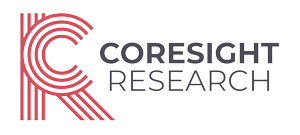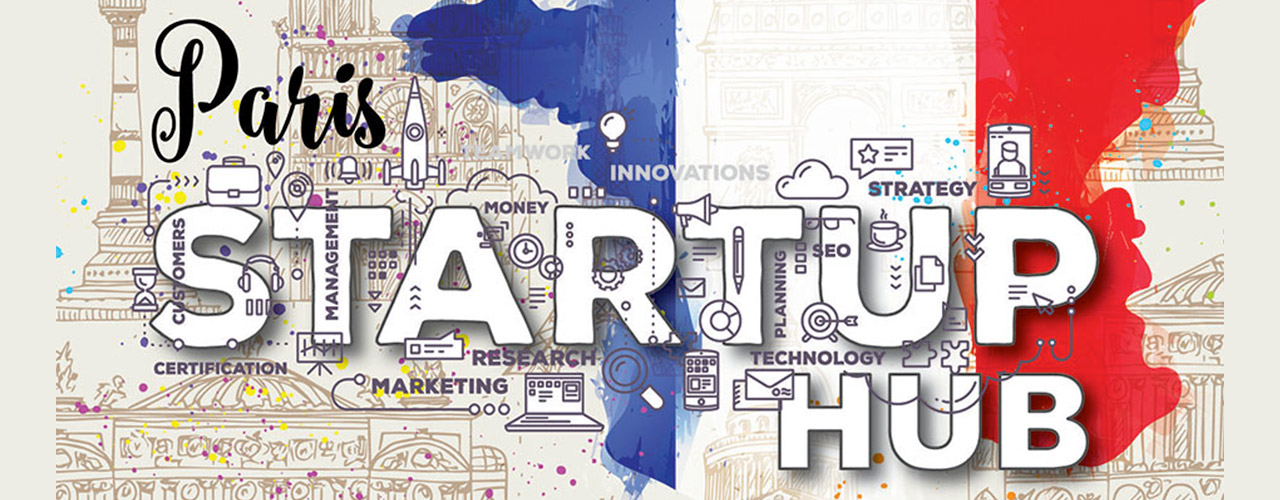
Deep Dive: Paris—The Third-Largest European Startup Hub

KEY POINTS
This is the third report in our series on European startup capitals. Paris is a leading startup hub globally and is the third-largest European center for startup development. The main factors that make Paris one of the top startup hubs include:
- Knowledge spillovers: The city is home to top universities and research institutions, and ranks high in terms of R&D expenditure.
- Access to capital: Paris-based tech startups perform well in terms of access to early-stage funding and crowdfunding.
- Market reach: The city’s economy is one of the largest in Europe.
Executive Summary
This is the third report in our series on European startup capitals. In it, we profile three Paris-based startups that have managed to attract substantial interest from investors: two tech companies, BlaBlaCar and Deezer, and Vestiaire Collective, a marketplace for the resale of luxury fashion.
Fashion and retail are the focus of two startup support programs launched by flash-sales companies Showroomprivé and Vente-privee.com. In 2015, Showroomprivé launched Look Forward, an incubator that supports new companies in fashion and retail, while Vente-privee.com announced the launch in 2017 of an accelerator program which aims to support companies in tech, fashion and retail. We profile the two programs, and the participating startups, in this report.
Paris is the third-largest startup hub in Europe by total investment, after London and Berlin. The French capital showed a total investment of €2.36 billion in 2014 (latest). Paris startups attracted an average of €106,580 investment per company versus €18,292 in Berlin, according to our analysis of data from Startup Hubs Europe.
Investments in French tech startups rose by 84% between 3Q15 and 3Q16, according to the research firm CB Insight. The French government and the city of Paris recognize the importance to the city’s economy of creating a favorable environment for startup. A mix of private and public investments will soon result in the opening of the world’s largest startup campus in Paris, Station F, a 35,000-square-meter startup incubator.
The report also examines how Paris compares with other startup clusters in Europe and across the globe. We consider two rankings: Compass’s 2015 Global Startup Ecosystem Ranking, in which Paris ranks 11th, and nonprofit organization Nesta’s European Digital City Index 2016, in which it ranked 6th. Paris excels in the following indicators:
- Knowledge spillovers: The city is home to top universities and research institutions, and ranks high in terms of R&D expenditure.
- Access to capital: Paris-based tech startups perform well in access to early-stage funding and crowdfunding.
- Market reach: With a GDP of $715 billion (€647 billion), the city’s metropolitan economy is one of the largest in Europe.
The ability to attract and retain talent and the business environment are factors that drag on Paris’s competitiveness as a startup hub. Stringent employment laws make the city one of the most difficult places to hire employees. The city performs relatively poorly in factors such as cost of office space and ease of doing business.
Introduction
Paris is a leading startup hub globally and one of the top European cities for startup development. Young companies in Paris benefit from the increasing level of investment from the public and private sector and from the presence of top-ranked universities and research institutions.
This report provides an overview of Paris as a startup ecosystem, and examines how the city compares with other startup clusters in Europe and across the globe. It is the third report in our series on European startup capitals. Our previous reports focus on London and Berlin.
We divide the report into two sections:
- The Paris startup ecosystem: This section reviews the city’s key startups and accelerators, with a focus on retail-related companies.
- The context: In this section, we consider two rankings: Compass’s 2015 Global Startup Ecosystem Ranking and Nesta’s European Digital City Index 2016.
1. The Paris Startup Ecosystem
In this section, we discuss the biggest Paris startups, profile two retail-related accelerators and provide a rundown of other notable accelerators and incubators.
Top Paris-Based Startups
BlaBlaCar and Deezer are the two Paris-based startups that raised a significant level of capital from investors, as shown in Figure 1. Vestiaire Collective—a fashion retail marketplace—also raised substantial investment.
BlaBlaCar is a car-ride sharing service that connects drivers and passengers heading to the same destination. The company operates in 22 countries. BlaBlaCar is backed by Accel Partners, Insight Ventures, Index Ventures and Lead Edge Capital, and received $200 million (€180 million) in funding in 2015, according to Crunchbase.
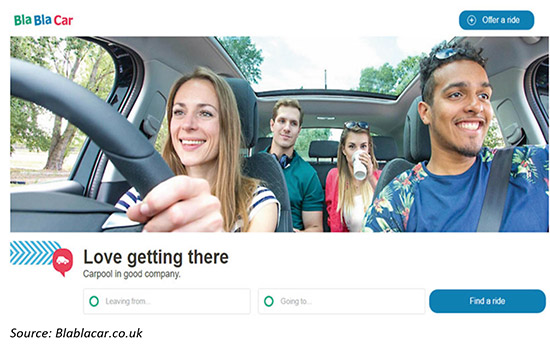
Deezer is a music-streaming app and online platform, which gives users access to a catalogue of 40 million licensed tracks and 30,000 radio channels. Deezer has an estimated 6.9 million subscribers as of December 2016, according to research firm MIDIA. The company raised $110 million (€99 million) in funding in 2016 alone, according to Crunchbase.

Vestiaire Collective is a marketplace for the resale of luxury goods, a sort of eBay for high-end fashion. Vestiaire Collective checks the quality of the items before they are dispatched to customers. This system strengthens consumers’ trust and the company’s brand reputation.
The company was established in 2009 and has received a total of $130 million (€118 million) in funding, including $62 million (€56 million) on January 24, 2017, according to Crunchbase. Investors include private-equity and venture-capital firms Vitruvian Partners, Ventech and Balderton Capital.
The company’s main market is France, where it generates 35% of its revenue, but the firm also operates in the UK, Germany, Italy, Spain and the US, and is planning to expand to Asia in 2017.

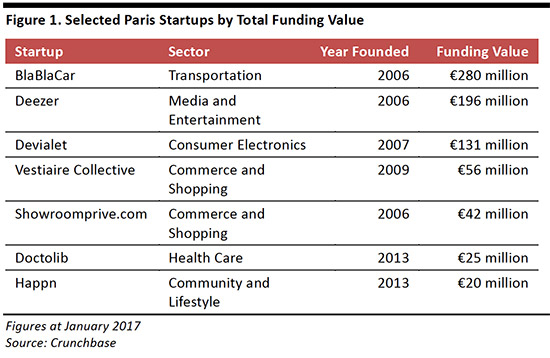
Retail-Focused Accelerators and Incubators in Paris
Paris is home to a number of accelerators and incubators. Accelerators and incubators offer different types of support to startups, which we describe in more depth in our report Accelerators & Incubators in London.
Look Forward and Impulse are two examples of retail-focused organizations in Paris that help startups to grow.
Look Forward by Showroomprivé
Look Forward is an incubator launched in 2015 by e-commerce flash-sales site Showroomprive.com. Look Forward supports fashion and retail startups with a year-long program. Moreover, the incubator organizes a yearly FashionTech festival to showcase the most significant initiatives from startups and fashion brands. This year, the festival will be held from June 28 to July 2 at La Gaîté Lyrique in Paris. By supporting innovative ventures, Look Forward aims to disrupt the way fashion is produced, distributed and consumed.
The program gives startups access to the incubator’s offices in Paris and to a pool of mentoring companies with expertise in finance, logistics, administration, HR, marketing and communication. Mentoring firms include bank Société Générale and Amazon Web Services.
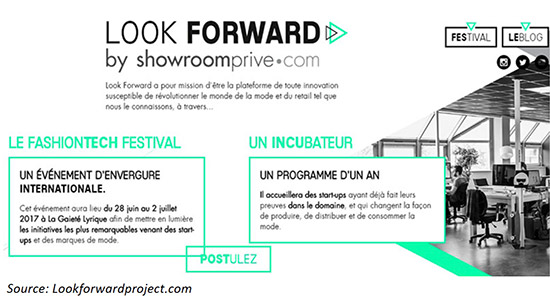
The selection criteria for a successful application to the program are the following:
- A focus on fashion and retail: Applicants should have the potential to disrupt the way the fashion and retail industry operates.
- International potential and scalability: Applicants need to prove that their business has the potential to grow and expand internationally.
- A viable and proven project: The companies applying must have been already founded and need to present a proof of concept.
- A committed team: The companies must have a team made up of passionate and pragmatic entrepreneurs that aim to see their firm growing.
In the following table, we profile the companies that have taken part in Look Forward’s program since its inception.
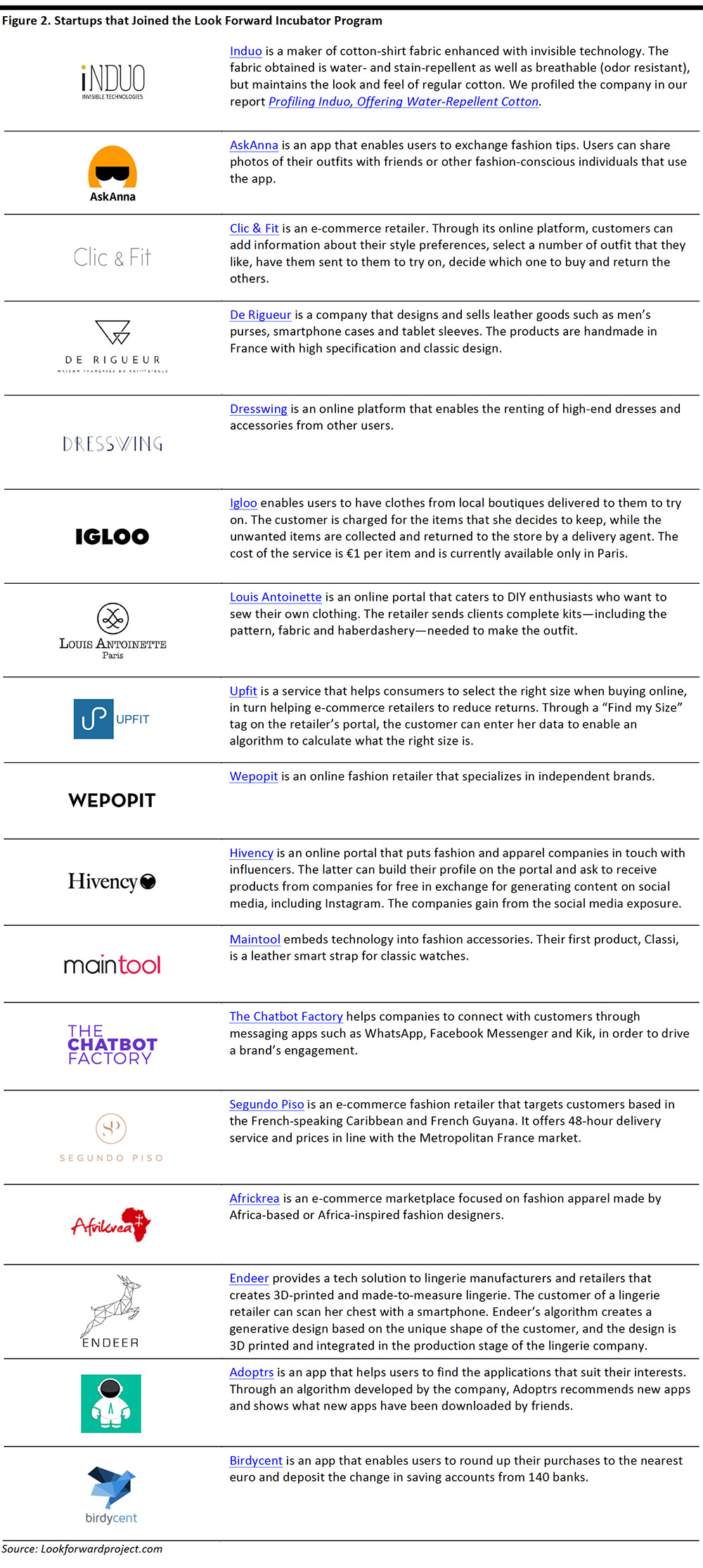
Impulse by Vente-Privee.com
Impulse is a soon-to-be-launched accelerator from flash-sales website Vente-Privee.com. The accelerator will be located in Station F, a startup campus that will open in April 2017, in Paris. We describe Station F in more detail elsewhere in this report.
According to its website, Impulse aims to “to support the best French and European startups involved in imagining the tools of fashion for tomorrow and the online and offline consumption of fashion, by developing the functionalities, technologies and services needed.”
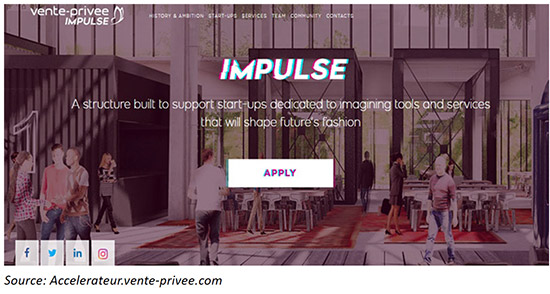
Impulse will provide a nine-month support program to new companies. The program will enable startups to access:
- A team of five people: These staff work full time at the accelerator to support companies.
- A business mentor: A professional that will share knowledge on the startup’s business issues.
- An elevator day: An occasion to present the business idea to a committee of investors.
- Mutual support sessions: Occasions to share ideas with other startup entrepreneurs.
- Workshops: Sessions on finance, legal, technical, commercial and fund-raising issues led by sector’s experts.
- Pitch training sessions: Support on fundraising and how to attract investors.
Vente-Privee.com is currently looking for 20 startups in fashion, tech and retail to join the program. The flash-sales firm is looking for companies that aim to provide solutions to optimize consumers’ online experience in the retail fashion sector and technical innovations aiming to digitalize and transform the customers’ shopping experience in fashion. To qualify for the program, companies should have the following characteristics:
- Objective: Startups should aim to grow their revenue and possibly aim for international expansion.
- Location: The companies must be based in Europe.
- Size and maturity: Companies should have at least two employees and 12 months of activity.
- Capital: The partners must hold at least 50.1% of the share capital.
- The team: The company should share the values of ambition, humility and integrity.
Other Paris Accelerators and Incubators
Further examples of accelerators based in Paris are listed below.
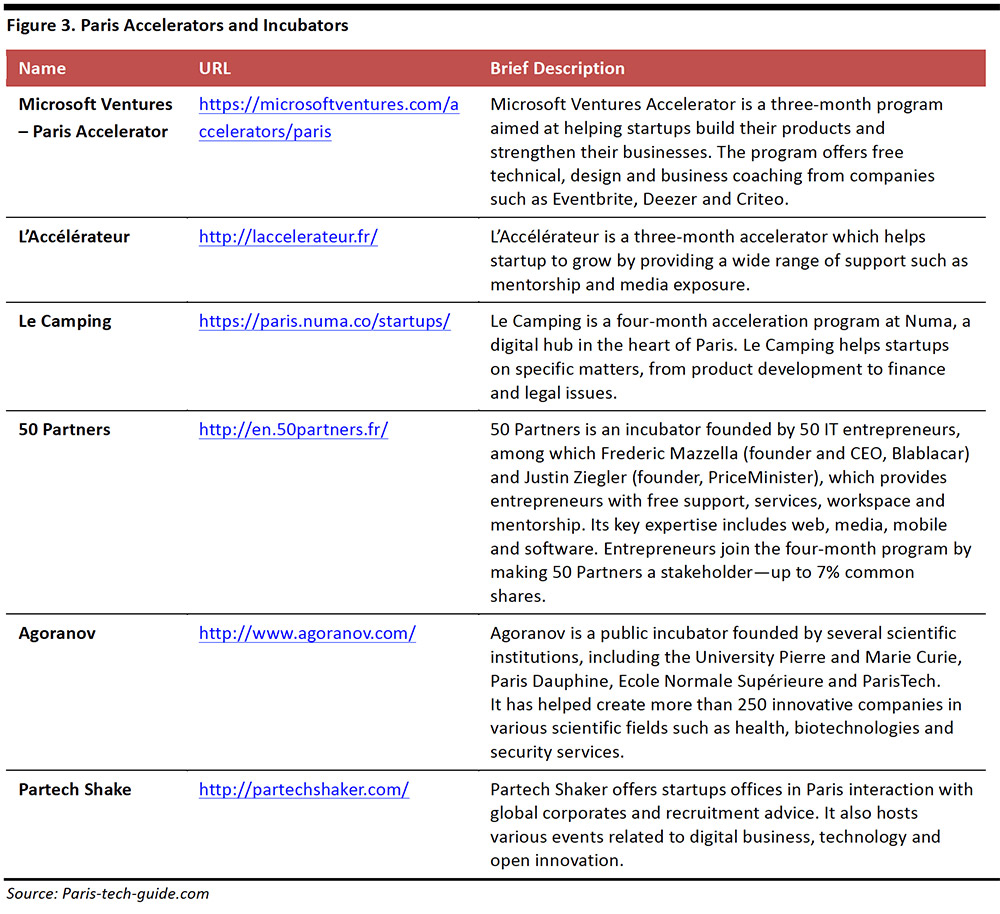
2. THE CONTEXT
In this section, we consider the environment for startups, accelerators and incubators in Paris.
Paris: The Third-Largest European Startup Hub and Catching Up
Paris is the third-largest startup hub in Europe by total investment. Despite registering lower total investment and a lower number of companies than London and Berlin, Paris startups attracted an average of €106,580 in funding per company versus Berlin’s €18,292, according to our analysis of data from Startup Hubs Europe.
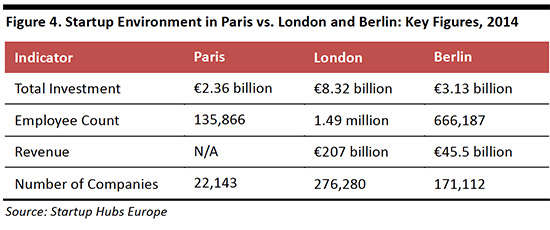
What Makes Paris a Top Startup Hub
The French government and the city of Paris recognize the importance of creating a favorable environment for startups to growth as a way to create jobs and boost the economy.
The city of Paris runs a series of initiatives aimed at helping startups to grow. These include Paris Finance Plus, which gives financial support to new companies that follow certain social and environmental criteria; Réseau Entreprendre Paris and Paris Initiative Amorçage, which supports with grants those startups with strong growth and innovation potential; and ADIE Paris Initiative Entreprendre, which helps new companies to access credit.
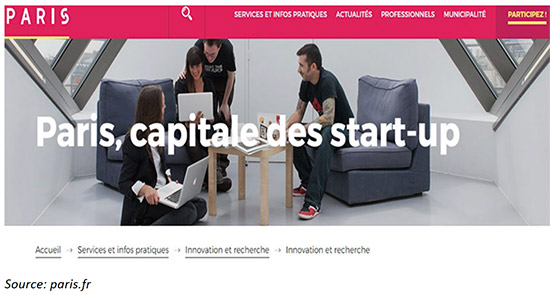
Public and private investments have been increasing in a bid to help Paris to catch up with other European startup hubs such as London and Berlin. Private investors have raised €200 million to build Station F, a 35,000-square-meter startup campus—the world’s largest such campus—expected to attract 1,000 domestic and foreign technology companies to the French capital.
Station F is part of an urban regeneration project which received €70 million in funding by the city’s authorities. Halle Freyssinet—the building in which the startup incubator is located—was used by the state railway company as a loading dock. The startup campus is expected to open on April 1, 2017. Impulse by Vente-Privee.com, profiled earlier, will be based in the campus.
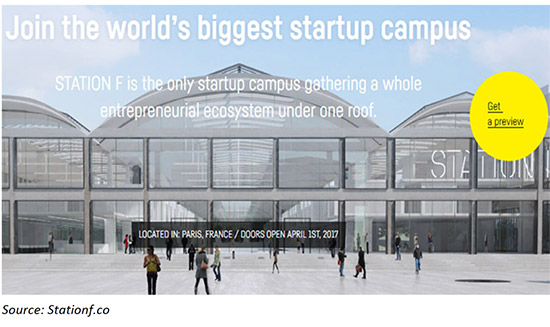
The efforts of both public and private investors appear to be starting to produce results. French investment in tech startups rose by 84% between the third quarter of 2015 and the third quarter of 2016, according to the research firm CB Insight. The vast majority of these investments were in Paris-based companies. The strong growth in investment flow is helping the French capital to catch up with London.
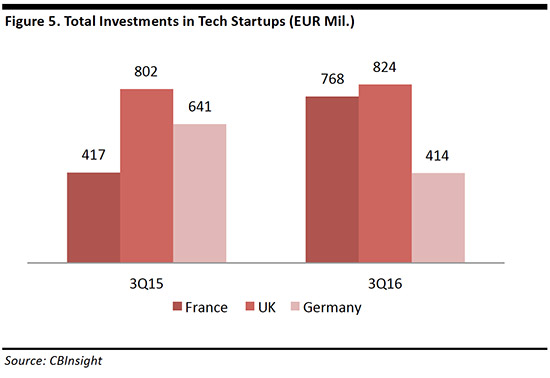
How Paris Compares with Other Startup Hubs
In order to better understand which characteristics make Paris one of the top startup ecosystems globally, we considered two indexes—one global and one regional—which rank startup hubs according to specific indicators: the 2015 Global Startup Ecosystem Ranking and the European Digital City Index 2016.
Paris Ranks 11th in the 2015 Global Startup Ecosystem Ranking
Paris is the 11th-best ecosystem for startups globally, according to the 2015 Global Startup Ecosystem Ranking compiled by Compass, a San Francisco-based online-analytics company. The index ranks startup hubs on five criteria:
- Performance of the funding invested in the startups
- VC funding and the time it takes to raise capital
- Talent availability
- Market reach
- Startup experience, such as mentorship by veteran startup founders
The criteria is based on insights collated from different sources, including surveys and interviews with startups and entrepreneurs. The index does not cover China, South Korea or Japan. In terms of specific indicators, Paris performs well in market reach, but lags other hubs in talent.
Market reach: With a GDP of $715 billion (€647 billion), Paris’s metropolitan economy is one of the largest in Europe, and significantly above the European average of $300 billion (€271 million), according to Compass. Other than the city’s economy, the US, France and China are the top target markets for Paris-based startups.
Talent: Paris lags other startup hubs in its ability to attract talent. Stringent employment laws make the city one of the most difficult places to hire employees compared to other hubs. It takes 54 days to hire an engineer in Paris. This compares with the European average of 47 days. Moreover, with only 22% of startup employees coming from outside France, the Paris scene is less diverse than in the rest of Europe, where the regional average is 35% of foreign employees working in startups.
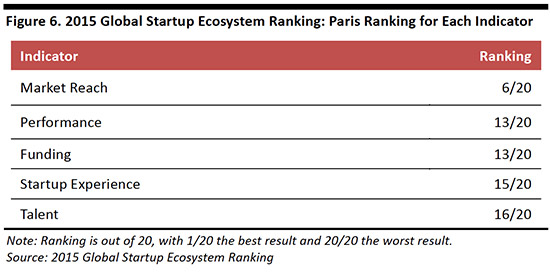
Paris Ranks 5th in the European Digital City Index 2016
The European Digital City Index 2016 ranks 60 European cities based on how well they support digital entrepreneurs. It is compiled by Nesta, a UK innovation and investment charity. The rankings are based on indicators such as availability of financing and skilled workers, and quality of supporting infrastructure and networks. In 2016, Paris ranked 5th.
Knowledge spillovers: Paris takes the top spot in this indicator. The city is home to top universities and research institutions, and ranks high in terms of R&D expenditure.
Access to capital: Paris ranks as a top startup hub in Europe for both early-stage funding and crowdfunding. Paris-based tech startups raised almost double the capital raised by Berlin-based startups and not much less than London startups, as figure 5 above shows.
Non-digital infrastructure: Good airport and train connectivity contribute to the result in this indicator.
Business environment: The city performs relatively poorly in factors such as cost of office space and ease of doing business. France tends to have higher taxes and bureaucracy than other European countries. Moreover, English is not widely spoken, remote work is still not popular and the cost of living is relatively high when compared to other large European cities.
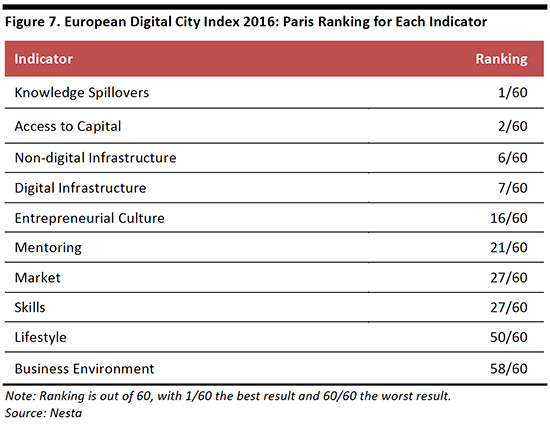
Key Takeaways
Paris is a leading startup hub globally and one of the top European centers for startup development. Paris is the third-largest European startup hub after London and Berlin by total investment attracted. The city ranks 11th in Compass’s 2015 Global Startup Ecosystem Ranking and 5th in Nesta’s European Digital City Index 2016.
Investments in French tech startups rose by 84% between 2015 and 2016, according to the research firm CB Insight. The main factors that make Paris one of the leading startup hubs include:
- Knowledge spillovers: The city is home to top universities and research institutions, and ranks high in terms of R&D expenditure.
- Access to capital: Paris-based tech startups perform well in access to early-stage funding and crowdfunding
- Market reach: Paris’s metropolitan economy is one of the largest in Europe and significantly above the European average.
The ability to attract and retain talent and the business environment are factors that drag on Paris’s competitiveness as a startup hub. Stringent employment laws make the city one of the most difficult places to hire employees. The city performs relatively poorly in factors such as cost of office space and ease of doing business.
